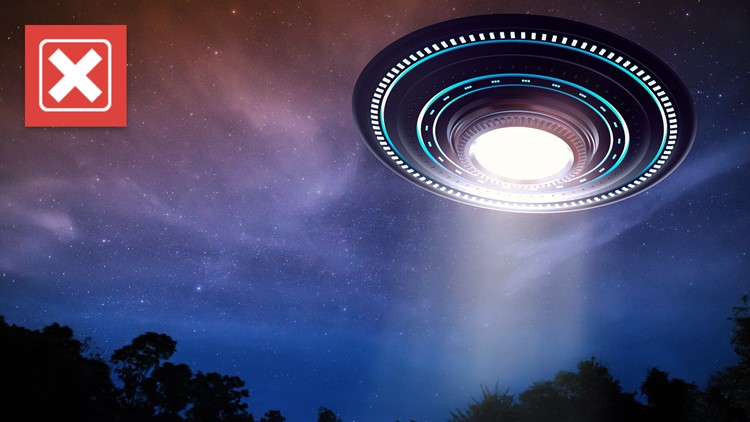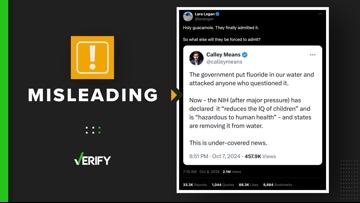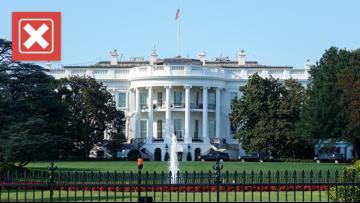UPDATE (5/17/2022): This story was published in 2021 based on the report's original release. The House Intelligence Committee's Counterterrorism, Counterintelligence, and Counterproliferation Subcommittee held a hearing based on the report on May 17, 2022.
The Office of the Director of National Intelligence on June 25 released a report about the government’s findings regarding unidentified aerial phenomena, colloquially known as unidentified flying objects (UFOs). The report comes years after The New York Times published U.S. Navy videos of UFOs, which the Department of Defense authorized the release of in 2020.
Following the release of the June 25 report, some people claimed the government said aliens were one explanation for the unidentified aerial phenomena.
THE QUESTION
Did the federal government’s report on UFOs mention aliens?
THE SOURCES
- Office of the Director of National Intelligence
- Seth Shostak, senior astronomer at SETI Institute
THE ANSWER
No, the report made no mention of aliens or extraterrestrials, but it also did not identify a source for nearly all of the aerial phenomena.
WHAT WE FOUND
The report released by the federal government was short – just nine total pages. There is no mention of aliens or extraterrestrial life.
The U.S. government said it found 144 reports of unidentified aerial phenomena (UAP) between 2004 and 2021. The UAP Task Force focused on reports “largely witnessed firsthand by military aviators and that were collected from systems we considered to be reliable.” Those systems included sensors, such as radar, infrared, electro-optical and weapon seekers.
Of the 144 reports, the UAP Task Force was able to identify just one UAP, which it concluded was a large, deflating balloon. The other 143 were not explained.
Seth Shostak, a senior astronomer with the SETI Institute, said the lack of explanation in the report was glaring.
“My takeaway was there was very little to take away,” Shostak said of the report. “I mean, it was an eight-and-a-half-page document. And it was very general, it didn't talk about any specific instances that these folks had analyzed.”
The government said when UAP incidents are resolved, they’ll categorize them in one of five ways:
- Airborne clutter: Objects such as birds, balloons and airborne debris.
- Natural atmospheric phenomena: Such as ice crystals and thermal fluctuations.
- U.S. government or industry developmental programs: UAP observations that could be attributed to “developments and classified programs by U.S. entities.”
- Foreign adversary systems: UAP technologies deployed by another country.
- Other: The government said this category is a “catchall.” “Although most of the UAP described in our dataset probably remain unidentified due to limited data or challenges to collection processing or analysis, we may require additional scientific knowledge to successfully collect on, analyze and characterize some of them,” the government said in the report. “We would group such objects in this category pending scientific advances that allowed us to better understand them.”
The government said a more efficient process, from standardized reporting to increased analysis, as well as additional funding and resources is needed to better identify the observed UAPs.
The report pointed out 18 incidents in which UAP movement patterns appeared to be atypical.
“Some UAP appeared to remain stationary in winds aloft, move against the wind, maneuver abruptly, or move at considerable speed, without discernible means of propulsion. In a small number of cases, military aircraft systems processed radio frequency (RF) energy associated with UAP sightings,” according to the report. “The [UAP Task Force] holds a small amount of data that appear to show UAP demonstrating acceleration or a degree of signature management.”
The unusual movements could be attributed to sensor errors, spoofing or observer misperceptions, but the government said more analysis is needed.
The report also concluded that UAPs pose a flight safety issue and may pose a challenge to U.S. national security.
But the report did not mention aliens or extraterrestrial life.
“The word extraterrestrial or alien, none of that appeared in the report at all,” Shostak said. “It wasn't even a sentence saying that we couldn't confirm them, or we could confirm [them], nothing. There's just nothing.”
VERIFY
Our journalists work to separate fact from fiction so that you can understand what is true and false online. Please consider subscribing to our daily newsletter, text alerts and our YouTube channel. You can also follow us on Snapchat, Twitter, Instagram or Facebook.













